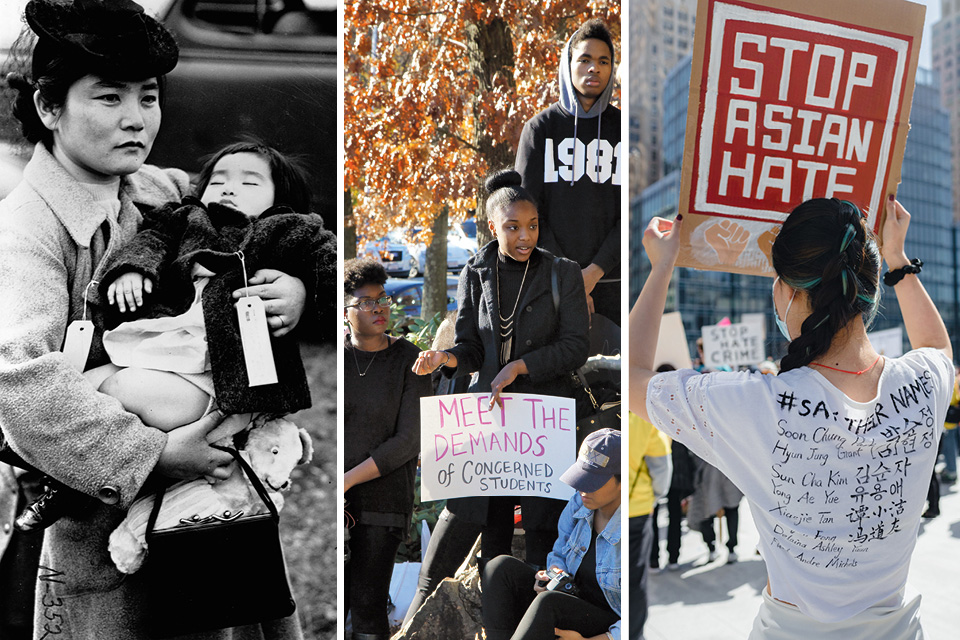Looking back on the first year of Brandeis' Asian American and Pacific Islander studies program
 Photos: Left: Getty Images. Center: Mike Lovett. Right: Public domain
Photos: Left: Getty Images. Center: Mike Lovett. Right: Public domainLeft: A Japanese American woman holds her sleeping daughter as they prepare to leave their home for an internment camp. Bainbridge Island, 1942. Center: Student demonstrators during the Ford Hall 2015 protests. Right: A demonstrator from an April 2021 event.
The past year saw a rise in hate crimes against Asian Americans and greater public attention toward anti-Asian racism in the wake of the COVID-19 pandemic.
These events also became the backdrop to the first year of Brandeis’ Asian American and Pacific Islander studies program.
The program was involved in numerous events during the past academic year, including a panel discussion on Asian Americans in the age of COVID-19, an Indigenous Peoples' Day teach-in, and a panel discussion and vigil in the aftermath of the Atlanta spa shootings. There has been robust research and scholarship by undergraduates, faculty and graduate students.
"In many ways, the formation of the program was quite timely because we were able to provide students, through our classes and also extracurricular activities, the ability to think through what was happening, to identify how this wasn't necessarily new, but to help them to understand how this fit into larger historical patterns of anti-Asian racism and violence that has been present basically since the beginning of our nation's history," said assistant professor Yuri Doolan, the founding chair of the AAPI program. “Anti-Asian racism is not new.”
Doolan was hired as an assistant professor of history and women's, gender, and sexuality studies; and chair of the program last summer. Four students were awarded minors in AAPI upon graduation in May. For the students and other campus advocates of the formation of the program, it has been a long time coming.
The seeds of the program were planted with activism by a group of students who were inspired by the Ford Hall 2015 protests. Over time, support snowballed to gain advocacy from faculty members and community members on campus. The initial demands of student activists in 2015 included a cluster hire in AAPI studies and the formation of a department. Instead, a two-year post-doctoral fellowship was dedicated to AAPI. Faculty advocacy supported student activism, and these tandem efforts eventually led to the formation of the program and the creation of Doolan’s position.
The student activism that has progressed the program has been carried on by the four new alumni who were part of the first cohort to receive a minor in AAPI from Brandeis. Students were a part of the hiring committee for Doolan’s position, and as the program has taken flight they have helped get the word out.
"A big part of our mission at the start was just getting people to know that this existed because it's the type of thing that you wouldn't necessarily come upon unless you were looking for it," said Carter Yee '21, who earned a minor in Asian American and Pacific Islander studies.
Having support from faculty on campus has been key in making progress, said Rachel Wang '21, also among the first cohort to receive a minor in Asian American and Pacific Islander studies.
"As students, we don't have access to a lot of the bureaucratic stuff that goes into making these kinds of powerful decisions happen," she said.
The program made connections through courses, events and research across the humanities and social sciences, including with the Department of African and African American Studies. A course taught by Soham Patel focused on Afro-Asian insurgency and solidarity.
“We must situate the recent racial violence against Asian American and Pacific Islander communities within histories of colonialism, labor exploitation, and imperial war,” Patel said. “In making these connections across history, we not only begin to re-conceptualize anti-Asian racism, but we may also begin to understand how race-making is structural, and therefore impacts AAPI communities as well as Black, Latinx, and Indigenous communities.”
Looking ahead, Wang said she was happy the program existed but wants more investment in the future in faculty and administrative support for the program.
“I'm glad that there's more attention being shed on the fact that we need to understand our histories of race, but just because there is more attention on anti-Asian violence year doesn't mean it's like this novel thing," she said. "I'm grateful this program exists, but there is still so much more that is needed.”
Categories: Humanities and Social Sciences, Research, Student Life





